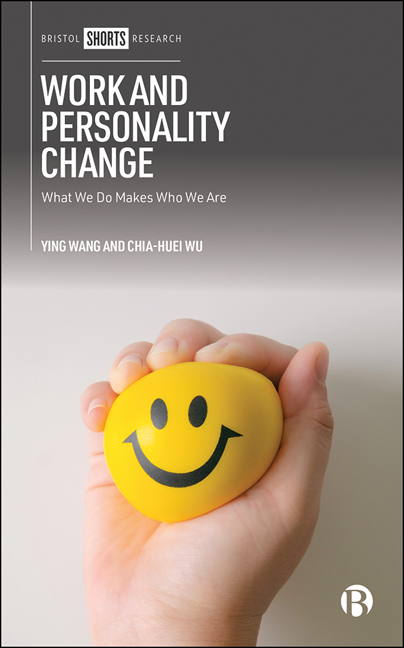Book contents
- Frontmatter
- Contents
- List of Figures
- Notes on Authors
- Preface
- one What Personality Is and Why It Matters for Organisations
- two Can Personality Traits Change, and How? A Review of Personality Development Literature
- three How Work Experiences Drive Personality Change: The Impact of Work, Organisational, Societal and International Environment
- four Intentional Personality Change: Individual Agency in Change and Interventions for Change
- five Implications of Personality Change at Work for Research and Practice
- References
- Index
two - Can Personality Traits Change, and How? A Review of Personality Development Literature
Published online by Cambridge University Press: 04 January 2022
- Frontmatter
- Contents
- List of Figures
- Notes on Authors
- Preface
- one What Personality Is and Why It Matters for Organisations
- two Can Personality Traits Change, and How? A Review of Personality Development Literature
- three How Work Experiences Drive Personality Change: The Impact of Work, Organisational, Societal and International Environment
- four Intentional Personality Change: Individual Agency in Change and Interventions for Change
- five Implications of Personality Change at Work for Research and Practice
- References
- Index
Summary
Personality is conventionally regarded as a set of stable and enduring individual characteristics that reliably differentiate individuals from one another. For instance, William James (1890, p 126) said that ‘in most of us, by the age of thirty, the character has set like plaster, and will never soften again’. McCrae & Costa (2003, p 3) defined traits as ‘the basic dispositions that … endure through adulthood’ based on evidence they collected over the years on the longitudinal stability of personality traits. Support for personality stability also comes from genetic studies, providing evidence that the heritability of Big Five traits is in the range of 0.50 ± 0.10 (see Bouchard & Loehlin, 2001, for a review). Theoretically, the stability of personality helps us better understand individuals’ attitudes and behaviours at work (see Tasselli et al, 2018, for a review) as we can use personality traits as predictors for a wide range of work outcomes. Practically, the prevalent use of personality testing in personnel selection is being operated under the premise that personality traits are highly stable, and thus that by understanding who our job candidates are we can generate a reasonably reliable prediction as to their behaviour and performance at work once they are employed in the job.
However, is personality truly as stable and fixed as many of us have always believed? Research in personality psychology over recent decades has started to challenge this assumption, and different evidence has emerged that shows an alternative possibility: that personality may be more malleable than we thought. In this chapter, we provide a review of theoretical perspectives on personality change and development. In the following sections, we first discuss changeability of personality and then review key theoretical perspectives from personality psychology literature to discuss why and how personality change occurs throughout our lifespan.
Shifting the paradigm: the changeable nature of personality
If we revisit earlier conceptualisations of personality, we can see that it was never ruled out that traits can be changed. Gordon Allport, the founding father of personality trait research, suggested that people change in response to their social environment: ‘The ever-changing nature of traits and their close dependence on the fluid conditions of the environment forbid a conception that is over-rigid or over-simple’ (Allport, 1937, p 312).
- Type
- Chapter
- Information
- Work and Personality ChangeWhat We Do Makes Who We Are, pp. 13 - 32Publisher: Bristol University PressPrint publication year: 2021



